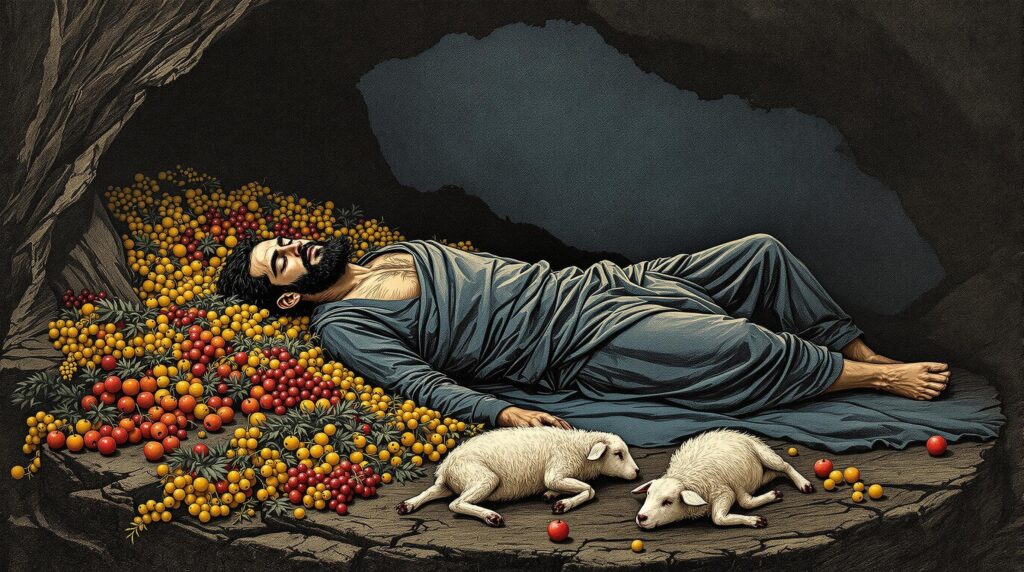This chapter depicts a critical episode in Zarathustra’s journey. In the first section, Zarathustra awakens one morning shortly after returning to his cave. He leaps from his bed with a terrifying scream. His outburst is so intense that it frightens his animals—the eagle and the serpent—and causes creatures from neighboring caves to flee. Zarathustra addresses an “abysmal thought” within himself, urging it to emerge from the depths. He refers to himself as the “cock and morning dawn”, determined to awaken this deep-seated thought. He implores it to unbind its ears, to listen and speak, insisting that once awake, it will remain eternally vigilant. Suddenly, he experiences a mixture of elation and disgust as the thought surfaces, exclaiming “Disgust, disgust, disgust—woe is me!”.
In the second section, Zarathustra collapses as if dead and remains in this state for an extended period. Upon regaining consciousness, he is pale and trembling, refusing nourishment and remaining motionless for seven days. Throughout this time, his animals stay by his side, with the eagle fetching food and placing it around him—a collection of berries, grapes, apples, fragrant herbs, pine cones, and two lambs taken from shepherds.

And what he fetched and gathered together, he laid on Zarathustra’s bed: so that Zarathustra finally lay among yellow and red berries, grapes, rose apples, sweet-smelling herbs and pine cones. At his feet, however, were spread two lambs, which the eagle had with difficulty stolen from their shepherds.
After seven days, Zarathustra sits up, smells a rose apple, and finds the scent pleasing. His animals take this as a sign to speak. They encourage him to step out of his cave, emphasizing that the world awaits him like a garden. They suggest that perhaps a new, burdensome knowledge has come to him, comparing his state to leavened dough that has risen and overflowed. Zarathustra responds by inviting them to continue speaking, finding solace in their words. He muses on the nature of language and communication, noting that words and sounds are like rainbows and bridges between souls, despite each soul being its own “world behind”.
The animals remark that for those who think like them, all things dance themselves: everything comes and goes, eternally returning. They describe the cyclical nature of existence: all things die and bloom again, the wheel of being rolls eternally, and the ring of existence remains eternally true to itself.
Zarathustra calls them jesters and barrel organs, acknowledging that they understand what transpired during his seven days of silence—his confrontation with a monstrous thought that nearly consumed him. He admits he is still weary and sick from this ordeal. He chides his animals for watching his suffering, likening their curiosity to human cruelty, as the human is the cruelest animal, finding pleasure in others’ pain.
He reflects on mankind’s nature, criticizing those who revel in lamentations and the poets who eagerly accuse life in their words. Zarathustra observes that man’s worst qualities are necessary for his best achievements and that humanity must become both better and more evil. He confesses that his despair stemmed not from the human’s evil but from the pettiness of both its best and worst traits.
Zarathustra reveals that he was overwhelmed by a profound nausea and weariness with mankind, haunted by the thought of the eternal return of the “small human being”. This brought him intense suffering and a deathly melancholy.
The animals then acknowledge that they know he is the teacher of eternal recurrence, recognizing that this destiny is both his greatest challenge and burden. They understand that he must teach the doctrine that all things eternally return and that they themselves have existed countless times before. They empathize with the weight of this knowledge and its potential to be both his greatest danger and his path to recovery.
They speculate that if Zarathustra were to die now, he would do so without fear, relieved of a great burden, acknowledging that he will return in the eternal cycle. Zarathustra remains silent, engaged in a profound inner dialogue. Respecting his introspection, the animals quietly withdraw to honor the deep stillness surrounding him.
